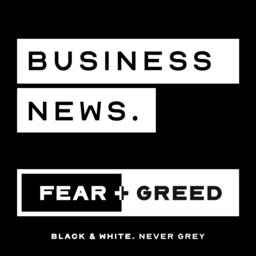Ask Fear & Greed: How did unregulated cryptos get on the ASX?
Listener Tammy asks: When or how did crypto form part of the value of the stock exchange?
I am curious as to how this asset has been able to become part of a highly regulated market without the regulations being "in general terms" applied to crypto under anti-money laundering and banking codes.
Has the creation of ETFs meant the introduction of crypto to the regulated share market?
Join Sean Aylmer & Michael Thompson as they answer listener questions.
If you have your own question for Ask Fear & Greed, get in touch via our website, LinkedIn, Instagram or Facebook!
FEAR & GREED | Business News
Daily business news for people who make their own decisions, with business journalist Sean Aylmer an…Social links
Follow podcast
Recent clips

Hate legislation on shaky ground; air traffic chaos; Hollywood’s highest grossing actor
15:36

Our $9 billion export that nobody talks about
05:54

Alphabet hits $US4 trillion; Coalition baulks at hate laws; record year for ETFs
16:08
 FEAR & GREED | Business News
FEAR & GREED | Business News
